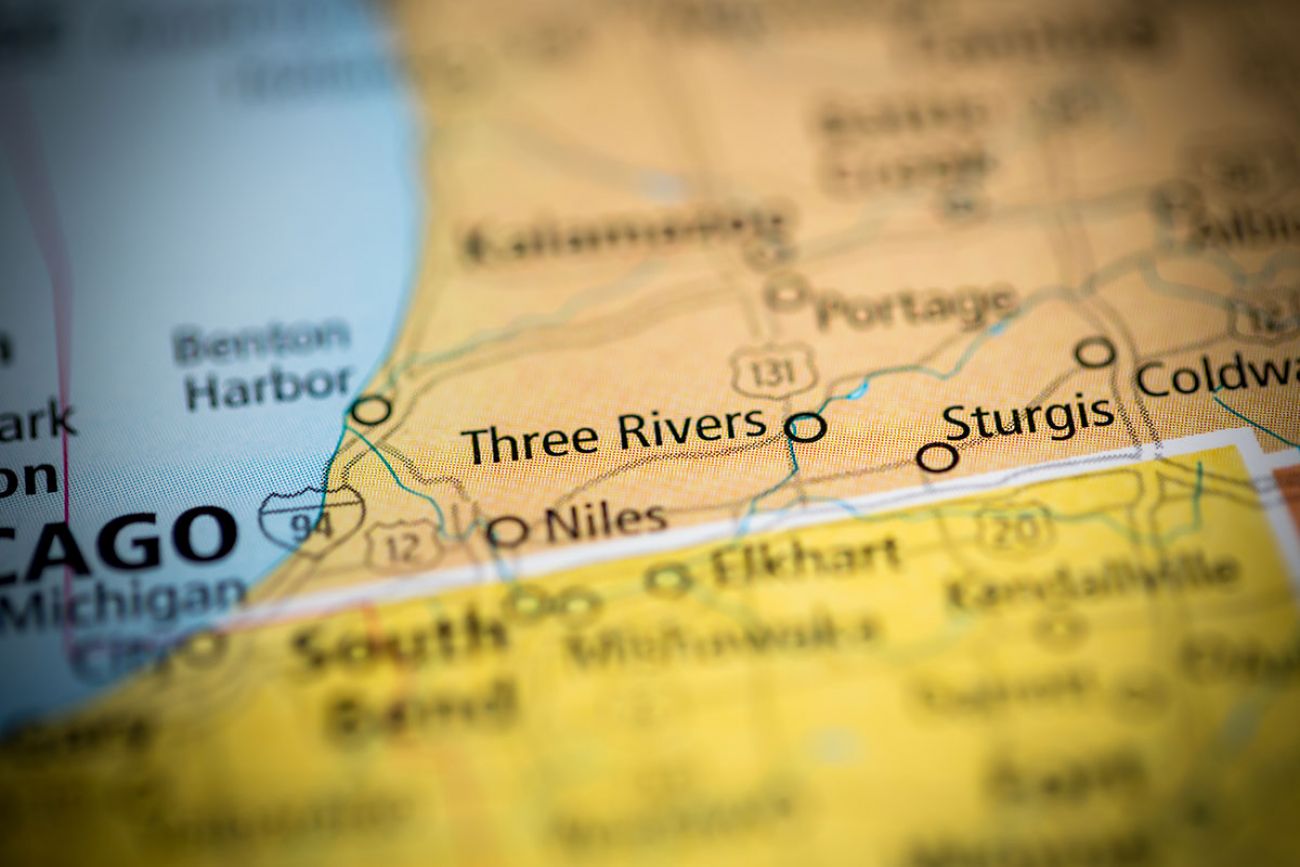Michigan Republicans lost badly statewide, but scored big in county races


- Republicans increased their numbers at the county commission level despite big Democratic victories statewide
- Local county commission districts, unlike state legislative districts, are drawn by local partisans
- Critics say the process allows for partisan gerrymandering
Last November, Michigan Democrats scored huge victories as Gov. Gretchen Whitmer easily won reelection and her party took control of the Senate and House.
But while Whitmer and fellow Democrats scored big in state-level races, that didn’t happen at the county level, where local politicians still redraw political boundaries.
Of the 619 county commissioners elected in Michigan last year, 444 (72 percent) were Republicans — an increase of five from 2020, according to a Bridge Michigan analysis of county commissioner lists compiled by the Michigan Association of Counties.
Related:
- Gerrymandering never died in Michigan. It still haunts county boards, foes say
- Michigan Legislature: Redistricting paves way for Democrats
- New districts give Democrats chance to flip Michigan Legislature
- Maps show how gerrymandering benefitted Michigan Republicans
The number of Republican commissioners increased in 22 counties. And 35 counties now have all-Republican commissions, up from 31 in 2020.
In contrast, Democratic commissioners increased their numbers in 11 counties and just three — Wayne, Washtenaw and Marquette — are now led entirely by Democrats, the same number as in 2020 (though it was Gogebic, Marquette and Washtenaw counties back then).
Unlike state legislators, whose new boundaries were drawn in 2021 by an independent bipartisan citizens commission, county commissioners ran in districts that are still designed and approved by partisan actors.
Under a 1966 state law, county commission boundaries are approved by a local redistricting commission composed of three elected officials — the county clerk, treasurer and prosecutor — along with leaders of the county Republican and Democratic parties.
So whichever party controlled at least two of the three elected offices can control the process to approve boundary maps. The commission posts are important because commissioners set policies on everything from economic development to human services while overseeing millions of dollars in spending.
Removing politicians from the drawing of legislative boundaries was the impetus for state voters’ approval in 2018 of the Michigan Independent Citizens Redistricting Commission for state and congressional races. This past November was the first election based on the redrawn maps.
Making sure the maps did not give any party a political advantage was a top priority of the MICRC. However, at the county level, it’s the last of eight guiding principles, which are listed in descending order of importance.
“If history is our guide, I would expect (partisan redistricting) to be leaned into,” said Douglas Spencer, a law professor at the University of Colorado who manages a website, All About Redistricting, that focuses on redistricting across the nation and advocates for reforms to end partisan gerrymandering.
“Those who are in power,” he said, “are balancing all of the factors to (work) in their favor.”
Other factors at play
To be sure, political gerrymandering does not totally explain the high volume of Republicans elected to county commissions.
Broad geographic stretches of Michigan have become more conservative and more heavily Republican, especially in rural regions, while Democratic voters tend to dominate heavily populated urban areas. That explains how Whitmer could win easily in the governor’s race even as Tudor Dixon, her Republican challenger, captured 66 of Michigan’s 83 counties.
Consider Bay and Alger counties: In both counties, Democrats controlled the redistricting process because they held a majority of county political positions, but the counties’ conservative voters flipped both commissions to Republicans in November.
In Bay County, a 6-1 Democratic majority became a 4-3 Republican body. Alger, in the Upper Peninsula, went from four Democrats and an Independent to four Republicans and a Democrat.
But in other places, partisan interests may have been at play.
In GOP dominated St. Joseph County, the Republican-led redistricting commission increased the number of seats on the county commission from five to seven. That increased a 5-0 Republican commission to a 7-0 Republican commission in November.
The county’s redistricting commission also took action this year that diluted the ability of a Democrat to win a commission seat. Three Rivers, a town south of Kalamazoo that has voted more Democratic in recent years, was split in half in the local map, pushing each half into more Republican heavy commission districts.
“It was definitely divided in a way where it was much less likely for a Democrat to get elected” to the county commission, said Carol Higgins, chairperson of the Democratic Party of St. Joseph County.
Only one Democrat ran for any commission seat in the county — in the second district, which included half of Three Rivers — and lost.
Rodney Chupp was chair of the St. Joseph County Republican Party when the commission maps were redrawn in 2021. Chupp, who has since stepped down, told Bridge the county redistricting commission added the two commission seats to ease the workload on individual commissioners by adding two more positions.
Chupp said he tried to draw maps that kept all of Three Rivers in a single district. But doing so meant the city of Sturgis, in the southeast part of the county, would have to be cut into three districts so each commission district would have roughly the same number of people.
The solution was to split both Three Rivers and Sturgis into two districts. Chupp acknowledged that he knew that if he split up Three Rivers “it’s going to look like gerrymandering, and it’s not.”
“It felt right, it felt fair and my goal was to be completely impartial,” Chupp said.
GOP shut out in Washtenaw
Democrats lost legal challenges to maps drawn both in Kent and Macomb counties — places where Whitmer won the county vote but Republicans remained in control of county commission seats.
But in Washtenaw County, home to Ann Arbor and Ypsilanti, Republicans were left grumbling. A Democrat-led redistricting commission adopted a map that yielded the same results as before: all nine commissioners were Democrats.
Whitmer got 72 percent of the vote in Washtenaw County in November, her highest percentage in the state. But eight townships in the county backed former President Trump in 2016 and seven backed Trump in 2020, yet there are no Republicans on the board.
Eli Savit, a Democrat and a member of the redistricting commission because he’s the county prosecuting attorney, drew up a map with 11 districts. The redistricting commission opted to stick with nine.
Savit told Bridge he urged two additional districts to make it more likely there would be greater minority representation on the county commission.
“I really don’t think anyone on that commission was motivated by partisanship,” Savit said.
But Savit, who abstained from the final vote approving the new map, also acknowledged that if the county had more commission districts it could have given Republicans a better chance at winning a seat.
There are, for instance, six contiguous townships in southwestern part of Washtenaw County that backed then-President Trump over Joe Biden in 2020. But that area is part of a 3rd District that also includes heavily Democratic Saline and Lodi Township. Democrat Shannon Beeman won 53-47 over Republican Robert Guysky in the closest of the nine Democratic victories in 2022.
Nancy Wang, executive director of Voters Not Politicians, the organization behind the 2018 statewide redistricting ballot proposal, said the group has heard complaints of gerrymandering at the local level.
She said her group would be willing to assist any county that wants to adopt an independent model like the Michigan Independent Citizens Redistricting Commission.
“If there are voters that want to end count-level gerrymandering, VNP would be glad to help in order to give power back to the people,” Wang said.
See what new members are saying about why they donated to Bridge Michigan:
- “In order for this information to be accurate and unbiased it must be underwritten by its readers, not by special interests.” - Larry S.
- “Not many other media sources report on the topics Bridge does.” - Susan B.
- “Your journalism is outstanding and rare these days.” - Mark S.
If you want to ensure the future of nonpartisan, nonprofit Michigan journalism, please become a member today. You, too, will be asked why you donated and maybe we'll feature your quote next time!


